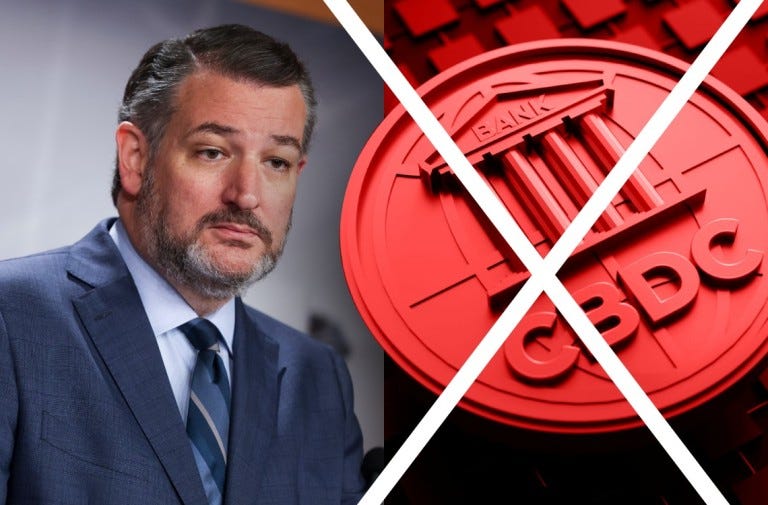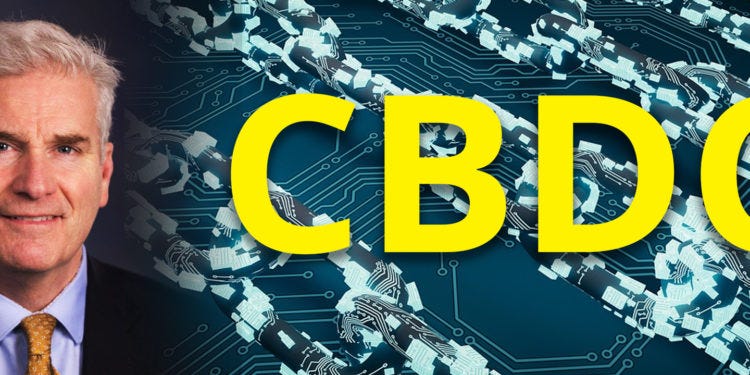The Digital Dollar is a "Dead Man Walking," a Victim of Political Polarization and Culture Wars
Hope remains for a wholesale digital dollar
The US’s digital dollar CBDC program is now a “dead man walking” as it becomes the latest victim of the election cycle, culture war, and extremist media.
Anyone following CBDC knew that a US digital dollar was a long shot. From the start, the Fed showed no interest and opined that a CBDC was a “solution looking for a problem.” Somehow the Fed didn’t take note that 2.3% of the US’s GDP is spent on payment fees or that 19.6% of the US population is underbanked or unbanked.
The movie “The Green Mile” with its meme “Dead man walking” seemed to fit the US CBDC program perfectly.
That the Fed prefers not to notice apparent flaws in the financial system shouldn’t be surprising after the Silicon Valley and Sovereign Bank collapses. To the Fed, payment as a “public good” does not exist, and your paying credit card interchange fees for eternity is simply business as usual.
The digital dollar is a “dead man walking” because while the Fed’s research into retail CBDC continues, it has no practical possibility of ever making it through congress or being accepted in a nation divided by culture wars. While a wholesale CBDC may still be possible, and I support this effort, it won’t be the transformational payment system that the US deserves!
I am proud to be the No. 4 global fintech influencer on the prestigious Onalytica influencer list. I got there by writing solid articles that people like you want to read. If you want crystal clear hype-free discussion on all CBDCs, fintech, crypto, and China’s tech scene, this is the place. All my writing is backed up by curating the best educational PDFs. Subscribe, and you’ll be glad you did!
“Biden Bucks” meant I knew this was coming
Last year the Biden administration introduced Executive Order (EO) 14067. The reaction was swifter than I anticipated. No sooner had the EO been published than the term “Biden Bucks” appeared, which signaled that CBDCs were seen only in terms of divisive politics. As soon as I saw that, I knew that CBDCs were in trouble!
Reactions were swift and, as usual, extreme, with many falsely claiming that the EO was approval to build a CBDC and eliminate cash.
Snopes fact-checked the numerous claims that EO 14067 would eliminate cash and create “Biden Bucks” a dystopian surveillance currency.
The web page claiming Biden Bucks would replace the dollar is from Jim Rickards, one of the most ardent anti-CBDC advocates who profits from selling gold.
I am fond of saying that the most virulent anti-CBDC attacks come from those selling Crypto, Gold, or Survival Bunkers.
The digital dollar is now under assault from three separate legislative efforts and a culture war:
1. Ted Cruz: Federal Reserve Act Amendment
Ted Cruz needs little introduction, and I will not focus on his politics, but this is his second attempt at blocking CBDC development. His first attempt in 2022 failed, and this effort will likely fail as well, given democratic control in both houses of Congress.
From his press release: “The legislation prohibits the Federal Reserve from developing a direct-to-consumer CBDC which could be used as a financial surveillance tool by the federal government, similar to what is currently happening in China. The bill aims to maintain the dollar’s dominance without competing with the private sector.
“The legislation prohibits the Federal Reserve from developing a direct-to-consumer CBDC which could be used as a financial surveillance tool by the federal government, similar to what is currently happening in China.”
Ted Cruz Press Release: here
Proposed Law: here
I am honored that Cruz mentions China! What is interesting is that he believes that prohibiting a US CBDC will help to maintain the dollar’s dominance as it will deter crypto innovation. Nothing could be further from the truth. As the rest of the world creates CBDCs, the dollar’s dominance will likely be challenged. Even more so if the dollar does not go digital.
What is surprising to me is that Cruz promotes crypto, saying: “The federal government can encourage and nurture innovation in the cryptocurrency space, or to completely devastate it.” While this is undeniably true, that Cruz believes crypto is the key to dollar primacy seems odd.
His legislation is simple because it amends the Federal Reserve Act “to prohibit the Federal reserve banks from offering certain products or services directly to an individual.”
The amendment:
‘‘No Federal reserve bank may offer products or services directly to an individual, maintain an account on behalf of an individual, or issue a central bank digital currency directly to an individual.’’
2. Ron Desantis
Ron Desantis is the governor of Florida and is running for president in 2024 and his opposition to CBDC is an election publicity stunt. Desantis believes that the financial sector will be “weaponized” by creating a CBDC, which he ties directly to the Biden administration. His state-level legislation, if passed, has little likelihood of blocking a CBDC if congress were to vote to build one.
Claiming that “The Biden administration’s efforts to inject a Centralized Bank Digital Currency is about surveillance and control,” there is little room for nuance or discussion on the modernization of the US’s payment systems.
There is little I can add read this statement:
“A federally controlled Central Bank Digital Currency is the most recent way the Davos elites attempt to backdoor woke ideology like Environmental, Social, and Governance (ESG) into the United States financial system, threatening individual privacy and economic freedom.”
Source, Florida Governor Website: here
The legislative proposal protects consumers and businesses from a federally controlled CBDC by:
Expressly prohibiting the use of a federally adopted Central Bank Digital Currency as money within Florida’s Uniform Commercial Code (UCC).
Instituting protections against a central global currency by prohibiting any CBDC issued by a foreign reserve or foreign sanctioned central bank.
Calling on likeminded states to join Florida in adopting similar prohibitions within their respective Commercial Codes to fight back against this concept nationwide.
To discuss the privacy protection features in CBDCs is meaningless. The discussion is over and with Florida as a crypto-friendly state, there is no room for debate as campaign contributions speak louder than words.
3. Tom Emmer
Tom Emmer joins Ted Cruz in referencing China’s CBDC efforts and will likely be unsuccessful. Stating: “As other countries, like China, develop CBDCs that fundamentally omit the benefits and protections of cash, it is more important than ever to ensure the United States’ digital currency policy protects financial privacy, maintains the dollar’s dominance, and cultivates innovation.”
I will at least give Emmer credit for being pro-blockchain, however, his rabid anti-CBDC stance is on a whole new level. He makes Cruz and DeSantis seem mild by comparison!
See press releases: here and here
Legislation: here
Here again Emmer claims that not having a CBDC will help to maintain the dollar’s dominance. While Emmer does not directly mention crypto as Cruz does, he is vocally pro-blockchain and views the private sector, which likely includes crypto, as the solution:
“In order to maintain the dollar’s status as the world’s reserve currency in a digital age, it is important that the United States lead with a posture that prioritizes innovation and does not aim to compete with the private sector,”
Emmer’s legislation seeks to amend the Federal Reserve Act:
“Except as specifically authorized under this Act, a Federal reserve bank may not offer products or services directly to an individual, maintain an account on behalf of an individual, or issue a central bank digital currency directly to an individual.’’
4. Culture wars and conspiracy theories
I never dreamed of mentioning disgraced radical radio and media host Alex Jones in my newsletter, but here we go. For those unaware of Alex Jones, in October of 2022, he was ordered to pay 965 million dollars to people who suffered from his false claim that the Sandy Hook Elementary School shooting (26 deaths, of which 20 were children) was a hoax.
I include Jones in this discussion because he remains an influential countercultural figure who, along with many others, is now focused on CBDC. He and other radicals see CBDC as the end of civilization or part of the “great reset.” They have gone as far as to suggest the current banking crisis was engineered solely to promote CBDC.
With this level of discourse, it is hard to see how a retail CBDC can overcome the daily barrage of critics who largely hinge their message on the false claims that:
You will have a bank account at the Federal Reserve
The Fed will know the identity of all payments made
The government will control all payments and implement a social credit system.
Any efforts to counter these “facts” are grounds for an immediate attack. I get them regularly on Twitter, and they are aggressive! That CBDC is now firmly in the camp of conspiracy theorists means that for an entire group of Americans there is no hope of convincing them that a CBDC would be helpful.
Alex Jones is simply the “worst of the worst,” but he is sadly still influential. He is one of many extremists who have now grabbed onto CBDC as a government conspiracy. Even the recent banking crash is seen as a conspiracy to launch CBDCs.
Wholesale CBDC our last hope
There is no good news on the retail CBDC front. However, during a recent US House Committee on Financial Services hearing, Fed Chair Powell made it clear that while retail CBDC needs congressional approval, a wholesale CBDC does not. Stating: “It is absolutely the case as it relates to retail CBDCs. There are potential forms of wholesale CBDCs that we would need to look at, it's less clear.”
Later stating that wholesale CBDCs “that would look an awful lot like a bank reserve.” The implication is that it would be within the Fed’s remit to issue a wholesale CBDC system just as it runs existing wholesale RTGS systems.
This is good news in that a wholesale CBDC would certainly help financial institutions transact more efficiently. Whether the American people will see any of these efficiencies translated into lower card interchange fees or cash transfer fees is another issue. As they say, don’t hold your breath.
Takeaways
–Retail CBDC in the US is dead and is now part of a larger culture and political war.
–There is no longer a middle ground or reasonable discussion on CBDCs as opinions are now polarized.
–Politicians claiming that not building a CBDC will protect dollar primacy are deluded as global payments will modernize without the dollar.
–Wholesale CBDC may still be an option, but this does little to update the US’s backward retail payment system.
–Wholesale CBDC will be attacked with religious like fervor because most do not distinguish between retail and wholesale versions.
–Those who say that FedNow will update payments will likely be disappointed. More on that in my upcoming report on FedNow. It’s no UPI!
If you’ve read this far, subscribing is the only logical course of action.
And share on Twitter because:
"The needs of the many outweigh the needs of the few or the one."
My work is entirely supported by reader gratitude, so if you enjoyed this newsletter, please do both of us a favor and subscribe or share it with someone. You can also follow me on Twitter, or Linkedin for more. The best way to ensure you see the stuff I publish is to subscribe to the mailing list here on Substack, which will get you an email notification for everything I post.
Everyone, including platforms that disagree with me, has my permission to republish, use or translate any part of this work or anything else I’ve written (except my books) with credit given to me and this site (richturrin.substack.com) free of charge. For more info on who I am, what I do, and where I’m going, check out richturrin.com
Rich Turrin is the international best-selling author of "Cashless - China's Digital Currency Revolution" and "Innovation Lab Excellence." He is number 4 on Onalytica's prestigious Top 50 Fintech Influencer list and an award-winning executive previously heading fintech teams at IBM following a twenty-year career in investment banking. Living in Shanghai for the last decade, Rich experienced China going cashless first-hand. Rich is an independent consultant whose views on China's astounding fintech developments are widely sought by international media and private clients.
Please check out my books on Amazon:
Cashless: HERE
Innovation Lab Excellence: HERE

















